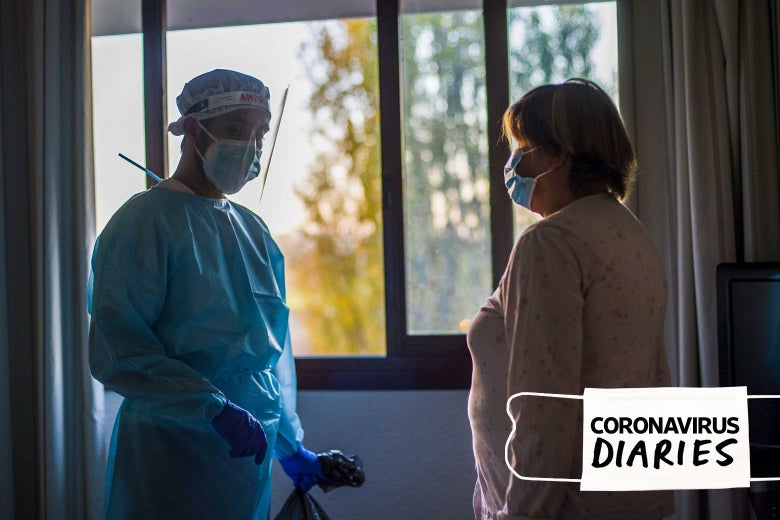
Coronavirus Diaries is a series of dispatches exploring how the coronavirus is affecting people’s lives. For the latest public health information, please refer to the Centers for Disease Control and Prevention’s website. For Slate’s coronavirus coverage, click here.
This as-told-to essay from Andrea Artoni, a doctor at a hospital in Milan, has been adapted from a conversation with Greta Privitera.
I put on my gloves, mask, cap, visor, water-repellent coat, boots, and then a second pair of gloves. I’m ready to go into a red zone. I didn’t miss these gestures. It took me a while to realize that we are back in the nightmare.
A gray door with the words “No Entry” and a red stripe on the ground separate the “clean” area from the COVID area. We are here again, wrapped in our coats, forced to recognize ourselves by our eyes, the only thing that shows. Inside, in the bubble, at first every breath is tiring. You don’t have enough air; it’s like diving underwater. There is little noise. We are all busy and concentrated. Patients are again many, especially the elderly and sick. Disoriented. Those most aware have a strong feeling of being locked up, in prison. Now they know everything about how the disease works, what can happen, and it is more difficult for us to reassure them. They know what being “intubated” means; they know what the COVID death is like. We, the health workers, feel less energized, but we are constantly called to try to fill this huge and distressing hole of loneliness into which our patients sink, with humanity, patience, and dedication.
This second wave is more difficult than the first, where the adrenaline kept us up. Today we are tired and in some cases even demoralized, but we don’t ask ourselves many questions. We keep our head down and we work, as always. Unlike in March, almost all the hospital wards have remained open for other patients, and rightly so. But this means that in the COVID departments we work tirelessly, with very little rest. We move forward, in apnea.
In all this effort and despair, if there is one thing that pisses me off, it is the deniers. Until a few days ago, I was smiling at their bullshit. It’s crazy for us who see what this virus does, to hear things like “it’s all hype from higher powers,” “hospitals take 2,000 euros a day per patient and then hospitalize the asymptomatic,” “the emergency rooms are full of people who feel well and ambulances go around empty, to scare us.” Today I no longer laugh. A dull anger rises. Come on, denier, come and see how you die from COVID. Take reporters into hospitals to see patients who can’t breathe, the dead, or our dripping sweat. Certain rhetoric is bad for the country that needs unity and empathy. We first were considered heroes, now we have to hear all of this. I’m not a hero, I just want to do my job in the best conditions for my patients, for the families.
We didn’t need a second wave, and seeing the performance of some countries, such as the United States, I admit that I am afraid there may also be a third. It’s crazy, but I remember exactly when I realized we were about to be swept underwater by the virus again. It was early October. I was going to pick up my daughter, who was having dinner with a friend, and while driving through the streets of the center of Milan, I really thought, “Shit, it will happen again.” The streets were full of young and old who drank, ate, and smoked without a mask, each a few inches away from each other. At that moment, in that exact moment, I felt like I was in front of a giant wave that was about to hurl itself on us. And in fact, two weeks later, Italy too had officially entered the second wave of the coronavirus. We all relaxed; we were devastated by the previous months, and we let our guard down. Today it has now been a month since my medical and nurse colleagues and I have returned to what the world calls the trenches of the battle against COVID. For us it is not a trench, though; it is our job.
Like in March, the hardest side of all of this is seeing our grandparents, our patients, die alone. Phone calls to relatives are the hardest part emotionally. I don’t know how many times in the history of humanity thousands of people around the world have been denied the last farewell, the last hug, the last shake of hands with the one you love. It is devastating to say on the phone, “It is very likely that you will never see your mother or your husband again.” I will carry all those phone calls inside me forever; some I dream of even at night. I keep hearing the words of an old man in my head who asked a relative to give his wife a last caress for him. The woman he loved for a lifetime. So much suffering.
I am not so afraid for myself. But I try to be very careful, for my family. I have seen many colleagues walk from the corridors in our hospital to an ICU bed. It’s not an easy disease. I have hope in vaccines. I really hope we will find a solution soon. We are tired, we all are. We need to come together and hug each other again.
"time" - Google News
December 01, 2020 at 05:59PM
https://ift.tt/2VoGErE
This Time, My COVID Patients Know How They’re Going to Die - Slate
"time" - Google News
https://ift.tt/3f5iuuC

No comments:
Post a Comment